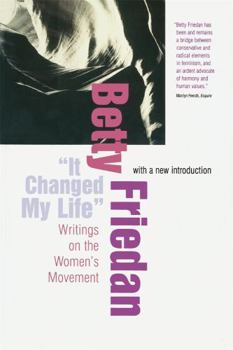"It Changed My Life": Writings on the Women's Movement, with a New Introduction
Select Format
Select Condition 
Book Overview
"It changed my life." That's what Betty Friedan heard over and over from women throughout the United States after the publication of her radical best-seller, The Feminine Mystique, sparked the beginning of contemporary feminism. The first stirring and uncertain years of the women's movement helped many women put a name to the sense of invisibility, powerlessness, and depression that Friedan famously called "the problem that has no name."
First published in 1976, "It Changed My Life" is a compellingly readable collection of reports from the front, back in the days less than a generation ago when women were routinely shut out of the professions and higher education, underpaid, condescended to, and harassed without consequences to the harassers. The book describes the political campaigns for equal pay and job opportunities, for the outlawing of sex discrimination, for the Equal Rights Amendment, and for legalized abortion, the creation of National Organization for Women, the National Abortion Rights Action League, and the National Women's Political Caucus, and analyzes the antifeminist backlashes. Encounters with Simone de Beauvoir and Indira Gandhi are juxtaposed with moving and vivid personal struggles of many ordinary women. Among those women was Friedan herself, who frankly recorded her astonishment, gratification, and anger as the movement she helped create grew beyond all her hopes, and then raced beyond her control into a sexual politics she found disturbing. A classic of modern feminism, "It Changed My Life" brings back years of struggle for those who were there, and recreates the past for the readers of today who were not yet born during these struggles for the opportunities and respect to which women can now feel entitled. In changing women's lives, the women's movement has changed everything.Format:Paperback
Language:English
ISBN:0674468856
ISBN13:9780674468856
Release Date:March 1998
Publisher:Harvard University Press
Length:528 Pages
Weight:1.65 lbs.
Dimensions:1.3" x 6.1" x 9.1"
Customer Reviews
1 rating
Exceptional collection of "Second Wave" writings
Published by Thriftbooks.com User , 24 years ago
Betty Friedan was a pivotal figure in the "second wave" women's movement of the 1960s and 70s. The publication of her book, _The Feminine Mystique_ in 1963 catapulted her into international celebrity. The book was a catalyst of change. Fueled by an economic boom in which a single wage-earner could provide a satisfactory standard of living for an entire family, post World War II women had been pressured to abandon the workplace in order to bury their identities in housekeeping and motherhood. Many middle class women felt stifled by the false feminine ideals and enforced domesticity of this era, and it was their frustration and anger to which Friedan's writing resonated. She was an educated Jewish woman with three children, a journalist, who had lived the suburban lifestyle, but who was propelled by her sense of injustice to speak to the larger world._It Changed My Life_ is a compilation of old and new writings, interviews, magazine articles, and recollections ten years after Friedan and a handful of other women founded the National Organization for Women (NOW) in a Washington hotel room. This book was published in 1976, at a time when the original energy of the "second wave" women's movement had been submerged in pro-lesbian, anti-family rhetoric, and the futile struggle to pass the Equal Rights Amendment (ERA) had many people questioning whether feminism was dead.Her exceptional and powerful writings prove Friedan to be an outspoken radical, a true leader of our times. She is a spokeswoman for the heterosexual woman who loves her children, but who also wants to be valued by the human race. Friedan spoke out against social and economic powerlessness for women, as well as false standards of "machismo" for men. Her goal was cooperation, not separatism.For instance, here is Friedan's interesting definition of feminism:"My definition of feminism is simply that women are people, in the fullest sense of the word, who must be free to move in society with all the privileges and opportunities and responsibilities that are their human and American right. This does not mean class warfare against men, nor does it mean the elimination of children, which denies our human future."It seems to me that _all_ the women's movement ever was, or needs to be, is a stage in the whole human rights movement - bringing another group, a majority this time, into the mainstream of human society, with all the perils and promises and human risks this involves. No more, no less. " (p. 317, paperback)Some of the most compelling writing in this book comes from a column originally published in _McCall's_ magazine between 1970-73. "Betty Friedan's Notebook" is a readable, page-turning narrative of Friedan's travels around the globe to spread the world of the women's movement. She was a busy speaker, much in demand, a dynamic personality in the lecture hall. The accounts of the public's response to her message in places like Brazil and It






